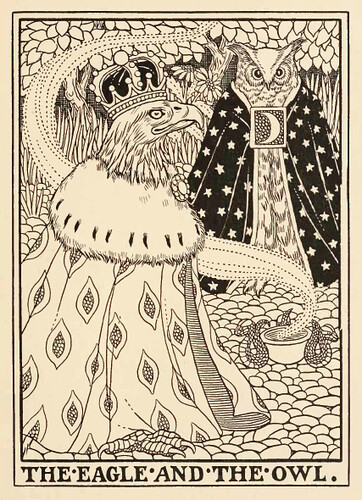462. Bubo et Aquila. Aquila et bubo, rixis sedatis, fidem obligaverunt neutrum socii pullos voraturum. “Norisne meos?” inquit Minervae avis. “Nullatenus,” respondit aquila; “illos describe mihi, ut intactos usquequaque servem.” Tum bubo, “Elegantes sunt nati mei, belli, venusti, sciti supra coaequales omnes; eos hoc signo facile noveris.” Dum ipse ibat praedam quaesitum, forte aquila conspexit monstra deformia, truci asperoque vultu et voce furiali. “Hos,” inquit, “non genuit amicus noster; voremus igitur.” Deglutivit totam familiam; pullorum pedes invenit tantum bubo reversus, heu, cari pignoris tristes reliquiae! Queritur et obsecrat deos ut scelestum tanti luctus auctorem plectant. Quidam interpellans ait, “Tibimet imputes casum; quin potius culpes legem, qua cuncti sui similem scitum, bellum, et venustum putant.”
Click here for a
SLIDESHOW of all the Billinghurst images.
M0462 (not in Perry). Source: La Fontaine 5.18 (translated into Latin prose by Fenelon; shortened). This fable is not in Perry’s catalog. La Fontaine may have used Abstemius as his source for the basic idea of this story; see #461. The owl was closely associated with Minerva (Athena), as was the eagle with Jupiter, and the peacock with Juno.
